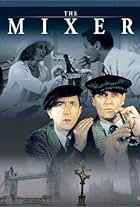Advanced search
- TITLES
- NAMES
- COLLABORATIONS
Search filters
Enter full date
to
or just enter yyyy, or yyyy-mm below
to
to
to
Exclude
Only includes titles with the selected topics
to
In minutes
to
1-5 of 5
- At the battle of Solferino Joseph von Trotta, a lieutenant in the Slovenian infantry, is wounded while saving the life of the young Austrian Emperor Franz-Joseph I. The Emperor rewards him by elevating him in society to a position quite out of keeping with his social rank, and which entirely alienates him from his farming background: Joseph gets promoted to the rank of captain, and is made a member of the nobility. Years later Joseph von Trotta accidentally finds a description of the battle that changed his life in a text-book belonging to his son Franz. Enraged at the over-emotional, patriotic and sentimental way in which the Emperor's rescue at the hands of "the Hero of Solferino" is depicted, he lodges a complaint at the Imperial Court. During an audience, the Emperor, displaying a certain degree of resignation, attempts to convince him that myths are both justifiable and necessary. Joseph, however, discovers "that it was nothing else but craftiness that assured the existence of the world, the power of the law, and the majesty of monarchs. He lost all belief he had ever had in the Emperor." Embittered, Joseph leaves the army and retires to his country estate in Bohemia. Consistent with his actions, he forbids his son Franz von Trotta from taking up a military career. The latter, in his capacity as a provincial prefect, develops into a typical duty-conscious civil servant who never thinks of questioning the monarchy and its existence. Franz then brings up his own son Carl Joseph in a strict, military manner, and forces him to take up a career as an officer against his will. The weak and sensitive grandson Carl Joseph von Trotta bears no trace of the strength and wilfulness of his grandfather. Rank and position are hollow-sounding concepts to him. When his beautiful mistress, wife of sergeant Slama, dies while giving birth to a child that could have been his, and his closest friend, the regimental doctor, Dr. Demant, is killed in a senseless duel because of an alleged love-affair with his wife, Carl Joseph - in an act of self-punishment - has himself transferred to an infantry unit on the Russian border. There he falls victim to alcohol and becomes embroiled in debt trying in vain to escape his depressions and irrational feelings of guilt. His friend Count Chojnicki only manages to drag him out of his melancholy and despair on one single occasion, when he has a mistress brought to him. Carl Joseph spends several carefree weeks in Vienna with Valerie von Taussig, but once he's back in the depressing frontier town he very soon reverts to his old ways. Meanwhile, nationalist and democratic forces are bringing the old Austro-Hungarian Empire to its knees. During the armed suppression of a factory-workers' strike that takes place as the violence continues to escalate, Carl Joseph von Trotta is severely wounded. After his convalescence he is determined to resign his commission. Then during an orgiastic summer party at Schloss Chojnicki, the news arrives of the assassination of the Austrian heir to the throne and his wife in Sarajevo. Soon afterwards, war breaks out, and Carl Joseph, whose resignment has not yet been granted, is sent to the front. There, heroically and without a trace of fear, he walks to his death as, without any protection or covering fire, he goes off to get water for his thirsty soldiers. With this unselfish deed for his nameless men Carl-Joseph once more remembers the roots of his humble origins.
- Sir Anthony Rose, a penniless nobleman, steals back stolen property with the help of his valet, Paul.
- This TV drama 2-parter deals with the socalled 'Blomberg-Fritsch-Affair' of 1938 in Nazi Germany. As a result of intrigue by Reichsmarschall Hermann Goering the names of the two highest ranking generals, Werner von Blomberg (supreme commander of the Wehrmacht) and Werner von Fritsch (supreme commander of the German armee) got blackened by dubious witnesses. Werner von Blomberg had unknowingly married a former prostitute and Werner von Fritsch was falsely accused of homosexual activities. As a result both noblemen had to resign from their duties and gave way for Reichschancellor Adolf Hitler to take over total control of the German armee forces.
- Italy gives sponsors the choice between banishment and prison. Mario Adorf decides to go into exile.


